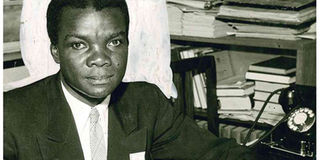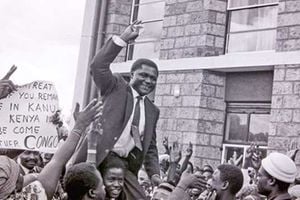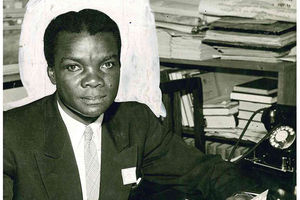
Lawyer and politician Argwings-Kodhek. In 1966, he joined the Cabinet as the Minister of Natural Resources and eventually in 1967 as Minister of State for Foreign Affairs. PHOTO | FILE | NATION MEDIA GROUP
The legacy of Kenya’s first African barrister and freedom fighter Argwings Kodhek still lives on 55 years after his tragic death on Hurlingham Road, now Argwings Kodhek Rd, in Nairobi on January 29, 1969.
Apart from his radical agitation and representing Mau Mau fighters pro bono, perhaps what many people don’t know is that he was the first nationalist to send Kenyan students for education in the Soviet Union and Soviet satellite states from 1957 through clandestine routes.
“There can be little doubt that Kodhek has systematically encouraged and possibly helped to arrange journeys to Cairo via ‘the Nile route’ and that he has been the link between would-be travellers and agencies in Cairo. The ultimate destination of many students is Eastern Europe,” wrote the Director of intelligence. A number of his letters intercepted by the Special Branch and confidential reports compiled on him by the colonial police reveal the sacrifice and the great assistance he provided to young Kenyans who were thirsty for higher education.
Because of such activities, Kodhek’s passport was withdrawn and on one occasion, a student heading to a university in Moscow attempted to swallow a letter of introduction he had given him after he was arrested in Gulu by the Uganda colonial police. In those days, no issue was as politicised as the education of Africans.
It was during the Cold War when the Soviet were engaged in a bitter battle with the West to win over young Africans by providing them with scholarships and training opportunities. This was because they saw educated Africans as future influential elites who would protect their interests.
On the political scene, the nationalists who received the scholarships distributed them among young Africans in the hope that they would empower them to fight European dominance and develop Kenya after independence. However, as much as the scholarships were a major weapon in combating European dominance, and an avenue of post-independence development, they also became a divisive factor among African nationalists who were engaged in a vicious battle of ambitions.
By then, Argwings Kodhek and Tom Mboya were engaged in a bitter political supremacy battle for Nairobi where they were eyeing the same political seat in the 1957 elections.
In 1956, Mboya’s reputation and prestige were enhanced when he made his maiden trip to the US and returned with financial support for 53 students who couldn’t raise their airfare to pursue further education in various American universities. To counter Mboya, Kodhek turned to the East and became the main link between Kenya and communist Europe.
Colonial government
The only hurdle to his scheme was that the colonial government was very antagonistic towards communism and took every step to prevent it from infiltrating the country. They denied passports, monitored and arrested students who had secured scholarships to study in the East. To overcome this, Kodhek used a clandestine route which involved the would-be students going through Uganda, Khartoum, and Cairo from where they boarded their flights to Eastern Europe. In this regard, one of his main contacts along the clandestine route was his Sudanese friend Mubarak Zarroug whom he had known in England during their studies. In 1952 Zarroug had tried to enter Kenya to represent Jomo Kenyatta who was facing charges of managing Mau Mau, but was refused entry.
Zarougs role in Khartoum was to offer accommodation to the students and organise their travel documents to enable them reach Cairo Egypt. For example, in April 1958, when Thomas Atuko was arrested while heading to Karl Marx University Leipzig to study law, the Special Branch found on him a letter of introduction from Kodhek to Zarroug.
Once the students were in Cairo they were processed for onward travel to Eastern Europe by the Kenya Office Cairo. The KOC as it was known was the most prominent organisation in channeling students behind the Iron Curtain. Its establishment could be traced back to the 1950s when Egypt became the centre for exiled African nationalists after the 1952 revolution which is widely hailed as a catalyst in the decolonisation of the third world during the Cold War. The government of Gamal Abdel Nasser financed their offices, propaganda and anti-colonial activities.
Around 1959 exiles from Kenya, Uganda, Nigeria and many other countries were already living in Cairo. In 1957 Uganda Office was established headed by John Kale the father of Kale Kayihura former Inspector General of Uganda Police. And the following year, in 1958, Kenya Office Cairo was established by Odhiambo Okello.
Its other members were Bunga Ochwata, George Okore Seda and Wera Ambitho. In April 1959, just a year after its establishment, political rivalry back at home extended to the Office when pro-Mboya and Pro-Kodhek factions emerged among its members. Kodhek’s faction was led by Okore Seda and Ochwata, while the other members were allied to the Mboya faction. Fearing that factionalism could threaten the prominent role the office was playing in helping students, Kodhek sent a letter to the members appealing for unity.
In May 1959, at the request of Kodhek, Seda moved from Cairo to Leipzig in West Germany, where he became established at the Karl Marx University. His role was to solicit for scholarships, guide students who arrived for education at the university, and to serve as foreign representative of Kodhek’s political party, the Nairobi District African Congress.
In just one month, Seda had secured two scholarships at Karl Marx University which were awarded to Thomas Atuko and Stephen Osire. The following year saw a rise in the number of students heading to Karl Marx on scholarships distributed by Kodhek. Among them were Charles Randiek Wanjare, Ogoda Oluoch, Ambrose Odiang’o Abuoro, Lucas Orembo Wanjare and Dixon Ngeso Okolo.
While most of them managed to sneak out to Leipzig using clandestine routes, others were not so lucky. For instance, on March 17, 1960 Randiek, Odiang’o and Orembo were arrested by the Ugandan colonial police at Gulu while attempting to cross into Sudan. The two had hired an Indian taxi driver at Soroti to drive them to Gulu from where they would sneak into Sudan.
However, on reaching Gulu they realised they couldn’t enter Sudan without having to go through the customs checks. They consequently approached an African Special Branch Officer of the Ugandan Colonial police to assist them enter Sudan without having to go through the checks.
They trusted the African officer so much that they even revealed to him their mission and informed him that they had confidential papers which they didn’t want customs officials to see. But instead of helping them, the officer radioed his colleagues at Gulu Police Station and all three students were arrested. According to the report of their interrogation at Gulu Police Station marked “secret “, they claimed that they were businessmen on the way to Sudan to open a shop for selling African curios. Half way through the interrogation Randiek requested to go to the latrine, and on being taken he attempted to swallow a handwritten note given to them by Kodhek. The note which was recovered by the officer who had insisted on staying with Randiek in the latrine was dated March 1, 1960 and read: “My Dear Zaroug, this is to introduce the bearer to you. He and his companion are on their way to a place of further education abroad. Kindly assist them in any way so that their journey may be expedited. I will come next time I am in the area. Cheerio, CMG Argwings-Kodhek.”
As a result of Randiek’s attempt to swallow the letter, he was charged with obstructing a police officer and sentenced to three months’ imprisonment in Uganda. His companions Odinga’s and Orembo were released and ordered to return to Kenya.
Scholarships
Sharing the same predicaments were two students, Mathew Mwaura Njuguna and Bartholomew Eustace Wanyeke Macharia, who were heading to Friendship University Moscow, also known as Rudn University or Patrice Lumumba University, courtesy of scholarships given to them by Kodhek. The university had just been set up by the Soviet Union to meet the education needs of Africans in key areas such as medicine and engineering, but also with the hidden aim of producing Soviet-friendly intelligentsia who would assist in the spread of communism to counter capitalism in Africa. On reaching Gulu, Mwaura and Macharia were arrested by the Ugandan colonial police. They were trying to hire a taxi to take them to Nimule, from where they would proceed to Juba, Khartoum and finally Cairo. A search conducted on them by the police recovered two letters written by Kodhek.
One dated June 17, 1960, read: “My dear Zaroug, many thanks for the previous and numerous thankless services. These two have every document & know business. You and me must help them to get out of Africa for a few years of education somewhere in Europe. I have told them to go slow and they will tell you everything in confidence. Please give them all assistance possible and oblige. Signed Clem M.G. Argwings-Kodhek.”
Another letter was addressed to the Registrar of Friendship University by Kodhek and it read: “My dear Registrar, Friendship University, Moscow. I have the pleasure to send you these two after some talk with the Professor in Conakry at the residence of President Touré of Guinea a few weeks ago. I am aware the course starts in September or October.
I have particularly sent the two early to make the application outside Kenya and to be acclimatised overseas. They have the qualifications. I am sending you and the professor a separate communication on the overall problem. Yours, Clem Argwings-Kodhek, African National Congress, Nairobi.”
Mwaura and Macharia were released after interrogation at Gulu police station and deported back to Kenya. But in just three months, they had secured passports from the colony immigration department after lying that they wanted to travel to the US and UK for business. A report prepared by the special branch on their movements and copied to the Permanent Secretary Ministry of Defence October 28, 1960 read: “Macharia left Nairobi by East African Airways flight EC 716 on October 25, 1960, giving as his destination 110, Fitzjohn’s Avenue, London NW3.
Mwaura giving the same destination, had previously left Nairobi by Alitalia flight AZ 507 on September 13, 1960.” The London address in question “110, Fitzjohn’s Avenue, London NW3” belonged to Ngumbo Njururi, who was assisting Jaramogi Oginga Odinga to channel students to universities behind the Iron Curtain. By then, Odinga had replaced Kodhek as the key source of scholarships to Eastern universities.
Communist aid such as scholarships tended to be channelled through selected nationalists not necessarily for their ideology but in the expectation that, with assistance, they would achieve power and help the Soviet achieve its goals. With Odinga emerging as a possible successor to Jomo Kenyatta especially in the run-up to the first Lancaster Conference and after his election as Kanu deputy president, the Soviets decided to cast their lots with him instead of Kodhek whose popularity was mainly in Nairobi. However, the two still worked together to send students behind the Iron Curtain.
Kodhek served in various positions in the government. At the time of his death on January 29, 1969, he was Minister of State for Foreign Affairs and MP for Gem.






